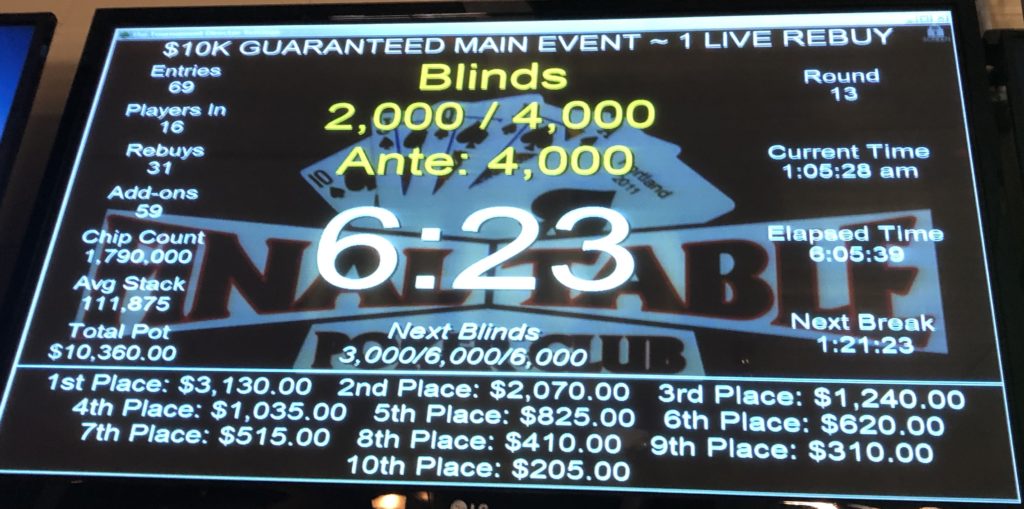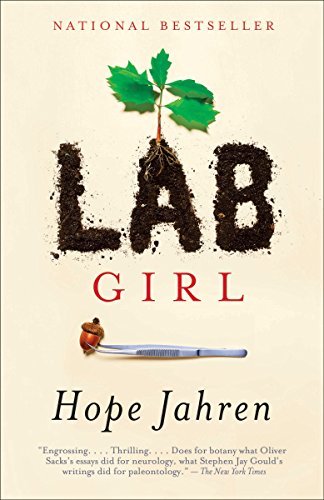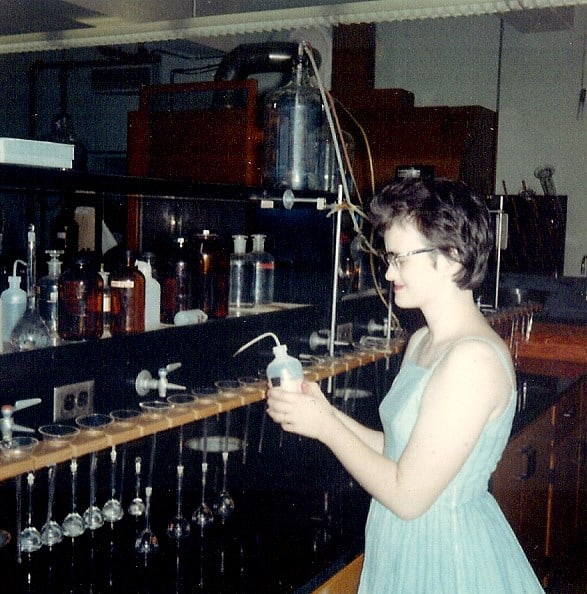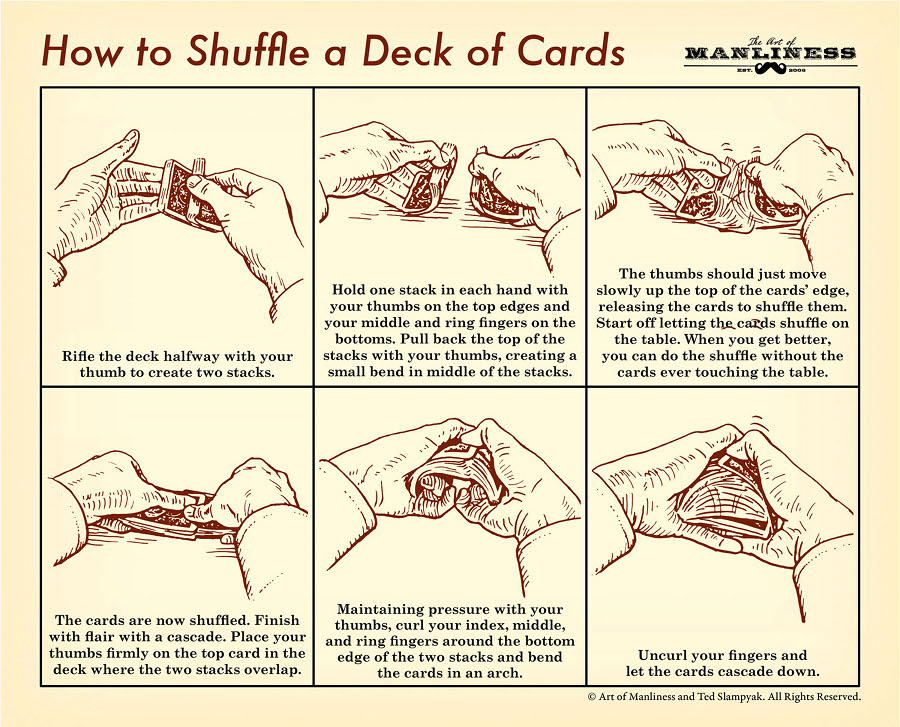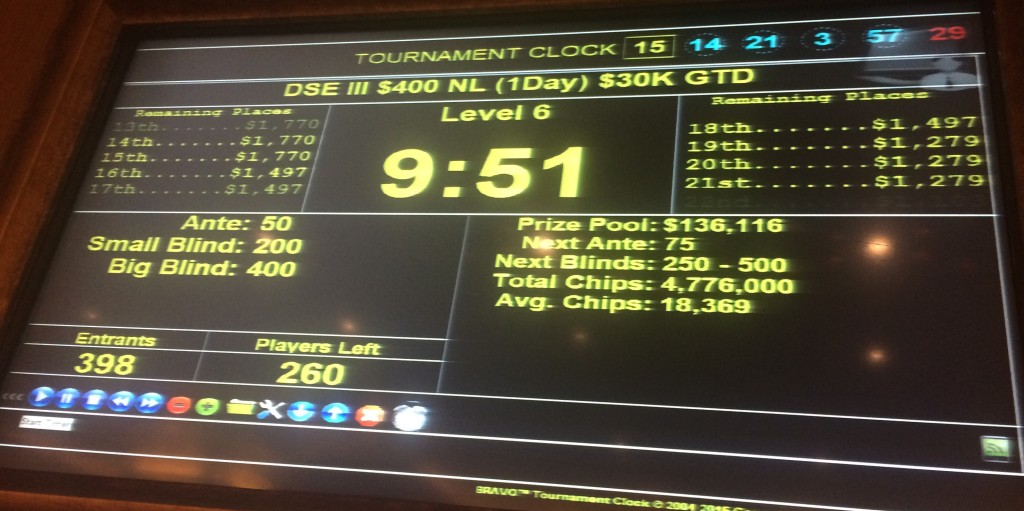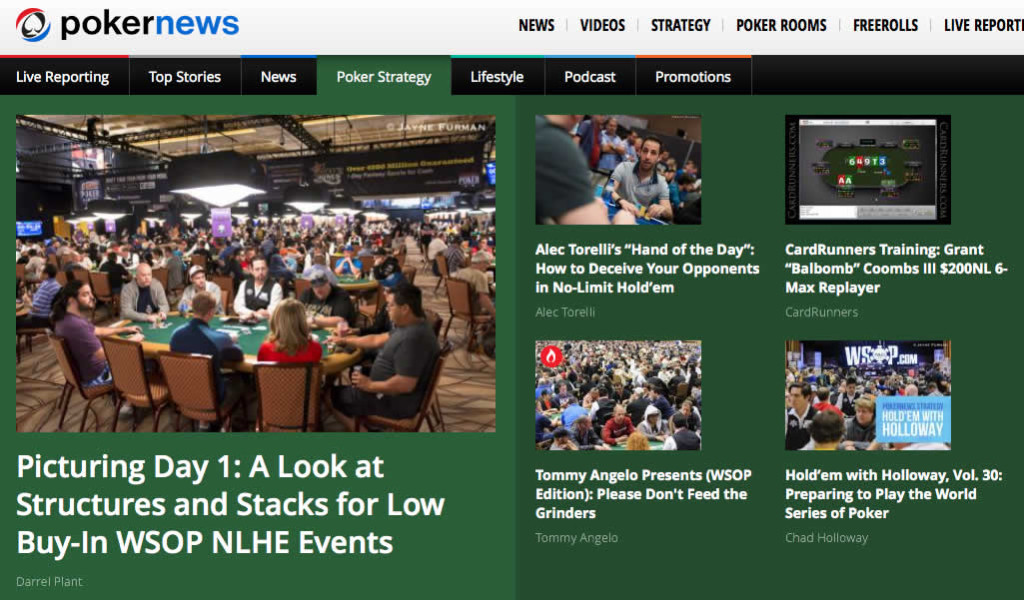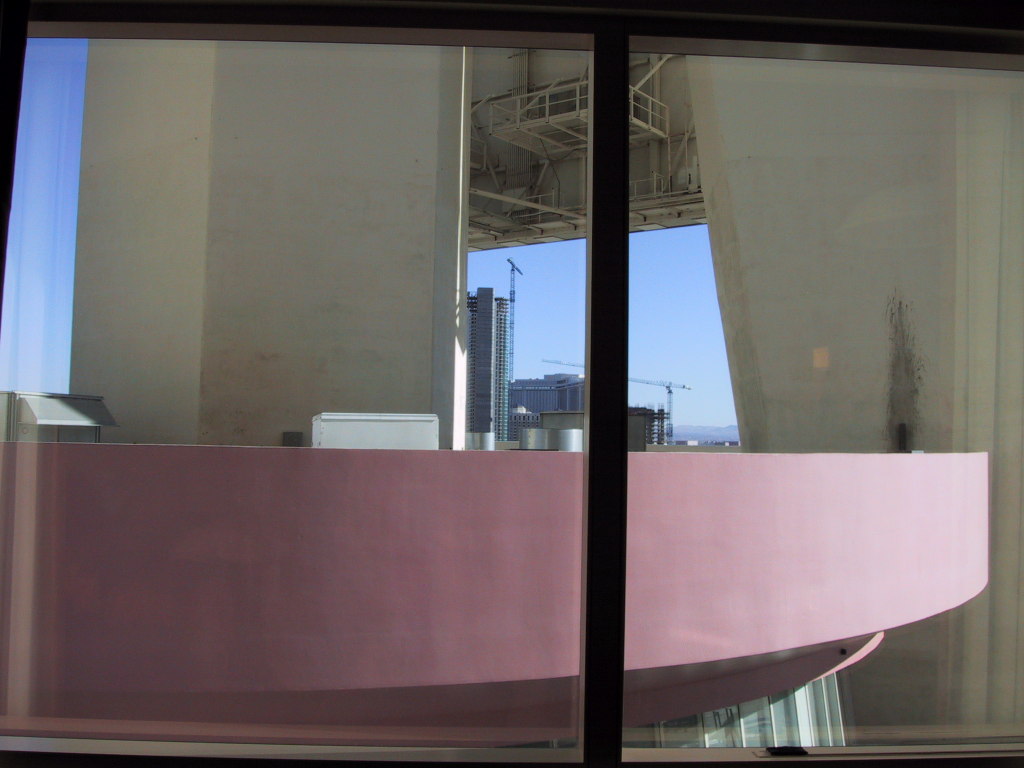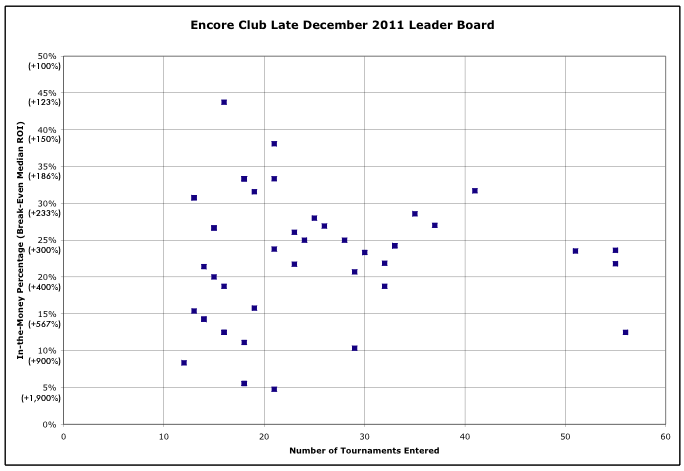Mother’s Day weekend was a couple weeks back, and everyone in our family had a good time getting together Saturday at my brother’s place for his son’s birthday party, then on the day itself at my house for dinner and a viewing of 20 Feet From Stardom, which had a lot of music that my mom loved. Then, a week ago, last Wednesday morning, while I was at my folks’ house to do some work on their computer, she died.
Don’t know exactly why, yet; it really doesn’t matter and it’s not going to change anything.
I don’t think Mom understood my interest in poker. Our family never had any money to speak of so they weren’t exactly in the gambling demographic. Both my parents grew up poor during the war and then the “boom years” of the 1950s. My father made a lot of trips to Las Vegas for conferences during his years working with the union, and he’d put a few nickels in the slot machines, but never more than two dollars worth. We certainly never took a family vacation there (did they allow camping?) and back in the day, there really weren’t a lot of places outside Vegas to gamble.
My folks played a little pinochle back when they were in college, but Dad was never into card games. Mom, on the other hand, played solitaire. Anyway, I got her a couple of solitaire programs for her computer which were used almost to the day she died. Dad didn’t see the appeal, but I think it was the puzzle-solving element of the game that attracted her.
She was a quality-control chemist at a plant that made glue and resin for the wood-products industry, so she solved a lot of puzzles in her job, like how to affect hundreds of thousands of pounds of a chemical mixture to get it back into tolerance. She fitted flooring and tile pieces in homebuilding projects, and she made a huge number of quilts. But she didn’t gamble, and neither did Dad.
Not having gambling in my background, I never made it to Vegas myself until after I was in my mid-40s. Even then, it was to present at a conference preceding the NAB, not to play cards or anything else. The conference paid for my room at the Rio, but no idea how much time I’d be spending there in later years. I wasn’t even playing poker at that point.
When I did start playing, several years later, my interest in the game probably looked more like mid-life, career-dead guy desperation to Mom (if so, I’m hoping she was uncharacteristically wrong). Risking money goes against everything my folks taught my brother and I. I remember being aghast when my brother had us meet him and his (then) future wife at Harrah’s New Orleans as we watched them lose a couple hundred playing blackjack in ten minutes; my wife and I just drank free beer. It was one thing to invest in something, or put money into a business, as my brother has very successfully (and me, not so successfully), but gambling? That’s just crazy.
And it hasn’t exactly been easy. I’ve had a number of low-to-mid four-figure wins, but not regularly enough to make it possible to cover living expenses. If I do get a large cash sometime in the future, Mom’s not going to see that I haven’t been wasting my time and effort the past three years since I got into poker seriously.
But I was at Dad’s house to keep him company the other night and played a little no-guarantee 6-Max tournament on Bovada, getting in at 15BB and taking top place. Not a big score, but I dedicate this one to Mom.
Bovada NLHE 6-Max (T1,500)
Hand 1 7♦ 6♠ UTG 1,500 50/100
It’s hand 1 for me, but the tournament itself has been going on for a while. I muck this baby.
Hand 9 K♦ A♦ BTN 1,200 50/100
Pretty standard disaster/windfall hand. UTG1 bets all but a fraction of his 1,980 chips, I go all-in, there’s a king on the river and his jacks lose.
Hand 12 6♣ 7♦ BB 2,550 75/150
One of those hands where slow-playing can work against you if you let the big blind in for free. UTG1 A♠ 5♠ and SB T♣ J♦ limp in. The flop’s 4♥ 3♥ 3♣ and I donk bet 230 with the gut-shot straight draw. UTG1 calls with his own straight draw. I bet 500 on a turned 4♣ and took it down.
Hand 16 A♦ K♣ UTG 3,005 75/150
Open-raise to 450 and take it down.
Hand 19 A♣ 6♣ BTN 3,005 75/150
UTG raises to 450 with J♠ Q♠ and gets called by UTG1 (T♥ T♠), me, and SB with T♣ 8♣. The flop is A♦ J♣ 9♥. SB only has 475 remaining and shoves his open-ended straight draw. UTG1 drops out, but the shove is called by UTG and myself. Q♣ turn makes two pair for UTG and gives me the flush draw, but completes SB’s straight. UTG shoves. I have him covered by only about 500 chips, but I call, and a 7♣ is the card for the river, making flushes for both SB (almost a straight flush) and myself.
Hand 35 K♣ T♦ UTG 6,565 100/200
I opened to 600 and UTG1 shoved his last 1,325 into the pot. Everyone else folded, I called, and the board ran out a very unlucky (for him) A♠ Q♥ 6♣ 8♥ J♥ to give me Broadway.
Hand 40 J♦ 9♦ UTG 8,290 100/200
Standard 3x open for me and everyone folds.
Hand 41 4♠ K♥ BB 8,590 100/200
A losing hand! And quelle surprise, it’s a big blind defense! Both my cards are outclassed when SB limps in holding A♦ 5♦. I’m nominally ahead on the T♦ J♥ K♦ flop, and I bet 200, but he calls my bet and and I go from being down 8% in equity to drawing dead on the 6♦ turn. I bet 400 to rep the flush, and naturally the nuts calls. He’s probably hoping I’ll try to bluff him out of it and checks to me on the river 9♠, but mama didn’t raise no idiot boys, even if one of them plays poker, so I just checked my top pair and took the hit.
Hand 43 A♣ 8♠ BTN 7,690 100/200
I don’t usually play this here unless it’s suited, but I was still in decent shape at the table, and had position when UTG raised and UTG1 called. The flop was a pretty decent Q♠ A♥ A♦ and we all checked it. The turn 6♠ was checked to me and I bet 1,000, UTG folded his J♥ 9♥, and UTG1 called, drawing pretty much dead. 3♣ on the river and I checked it through, just in case I was against a full house, but no.
Hand 44 A♦ 8♠ UTG1 10,190 100/200
I guess I was feeling frisky and raised this to 600, getting called by the blinds (both with better hands). The flop was 4♠ K♣ 5♠, BB bet 600 with his K♥ Q♥ and both SB with A♠ Q♣ and I folded.
Hand 45 Q♦ K♥ UTG 9,590 100/200
Not one to be daunted, I raised this and took the blinds.
Hand 47 J♥ A♦ SB 9,615 125/250/25
The power of aggression takes one. BTN limps in, I raise to 1,000, and he calls. The flop is 5♦ 5♣ Q♣ and I c-bet 1,000. He goes all-in for just over 1,000 more and despite getting a good price (5.5:1), I fold. He had A♠ J♣.
Hand 48 A♣ A♦ BTN 7,590 125/250/25
If only I’d had this the last hand. Raise and win blinds.
Hand 50 A♠ K♣ UTG 8,040 125/250/25
Raise and win.
Hand 61 Q♠ T♥ SB 8,615 125/250/25
A couple more raise and fold hands then some action. BTN called with Q♣ 8♣. I raised to 750, BB called with A♦ T♦ and BTN continued. The flop was 8♦ J♠ J♣ and everyone checked. With a turn 9♥ I bet 1,000 and everyone folded.
Hand 65 J♦ J♠ UTG 10,165 125/250/25
Significant movement and a knockout. I raised to 750 and SB called with Q♠ K♠. The flop was 3♠ J♣ T♠ and got checked by both of us. The turn 7♠ put me top set hand in peril, and I got into a raising war which had him all in and me down to a couple thousand chips if I lost. Fortunately, the river 7♣ made my full house and I won.
Hand 67 T♣ A♠ SB 18,018 150/300/30
UTG2 limped in and I raised to 900. He came along and the flop was K♣ 4♦ J♥, He bet 600 (with 8♠ 7♠!) and I called, which slowed him down. We checked through the turn K♦ and 9♠ river, and my ace-high took the pot.
Hand 68 A♣ Q♣ BTN 19,968 150/300/30
UTG1 went all-in with just under 3,000 and I raised all-in to isolate. He showed 4♦ 4♣, which ended up being the best hand when a four hit the flop and the last one showed up on the river. The best hand I had was the pair of fours on the board.
Hand 69 4♠ 4♦ UTG2 17,086 150/300/30
Figured if fours were working that well on the last hand, I’d raise these, but we didn’t even get to the flop.
Hand 74 Q♥ T♥ UTG1 17,086 150/300/30
UTG limped in and I raised to 1,000. He called, which put us heads-up to the flop. We both checked it to the Q♠ on the turn and he went all-in for about 2,250. I called and beat his Q♦ 7♦.
Hand 75 6♥ J♥ BB 20,918 150/300/30
We’re four-handed at the table and the first two actions fold, SB limps in and the flop is Q♠ K♠ 5♠. Not exactly my color. 9♥ on the turn gives me a gut-shot draw, and I call a bet of 600, but fold on the 9♠ river and a bet. SB had K♦ 6♠ for a made pair on flop and flush at the end.
Hand 76 A♦ 4♦ SB 19,988 150/300/30
Still 4-handed. BTN limps in, I raise to 1,000. and we’re HU on the 8♣ 9♠ 2♥ flop. I c-bet 1,000 and he calls again. Turn 7♣, I’ve got nothing, and I’m drawing to a pair of aces at best. I check/fold to a 2,210 bet, which is good, because with J♣ T♣ he’s got a made straight and a draw to a straight flush.
Hand 89 A♥ 6♣ BB 18,058 200/400/40
It’s down to three of us (seven players still in the tournament and the other table has four). Seat 1 is BTN for this hand, with less than 8BB. Seat 3 has been knocking players out and has 86BB in SB. I’m down in the middle with 45BB. SB min-raises to steal with Q♦ 9♥ and I call with my ace. We check through to the turn and the board reads 3♠ 7♠ 2♠ 7♦ when I bet 600 and he calls. 4♥ on the river and we both check; the ace in the winner.
Hand 94 A♠ 3♠ BTN 18,578 200/400/40
Everyone gets an ace this hand. Seat 1 has been draining away, and folds to me 1,200 opener. Seat 3 calls. The flop is 8♥ 2♣ 6♥, BB checks and I bet 1,300, which he calls. We check the 9♦ turn and the river is a 4♥, which he bets for 2,660. I fold to his A♣ J♦. This would have been a winning hand for the short stack; he would have had the only pair with A♦ 2♦.
Hand 95 5♠ 7♣ BB 16,038 200/400/40
I defend to a SB min-raise again and get a pretty good flop of 4♥ 3♠ 4♦, then call a c-bet of 800 with my gut-shot draw. neither the T♠ turn or 2♠ river get me there and I fold to a bet of 1,660 on the river. SB had 8♦ 8♣ this time.
Hand 102 A♥ A♦ UTG2 15,388 250/500/50
It’s final table time. I’m in Seat 2. Seat 1 has 40BB and sits in second position. Seat 3 has just over 9BB; Seat 4 is at 35BB, a bit more than me; the extreme short stack from my previous table is down to 3BB before the hand in Seat 5; and the big stack from our table has 77BB in seat 6. This is the hand that makes me for the tournament. UTG1 raises to 1,199 and I call. BTN folds (a pair of eights) and it’s HU to the flop of 9♣ T♠ 7♦. UTG1 checked and I shoved, thinking it might look like I was trying to steal a pot because no high cards hit. Sure enough, he called, showing K♥ K♣ for a big old cooler. That put me in second place with 63BB and dropped him into the sub-10BB zone.
Hand 107 T♥ T♠ BTN 30,776 250/500/50
Seat 1 put more than a quarter of his stack in as a raise with K♥ 3♥ and I shoved ion him despite that the big stack was in BB and still to act pre-flop. He folded. I think having the kings cracked must have tilted him, because a couple hands later he defended deuce-four off-suit to a pre-flop raise from the big stack and went all-in for the rest with bottom pair on the flop.
Hand 111 T♣ A♥ SB 32,280 250/500/50
A little tangle with the big stack, in which I manage to get off relatively lightly. I call a raise to 1,500, we get to the turn with the board reading 9♥ 3♠ 4♦ 2♣ and I call another 1,000 on my straight draw, which doesn’t come. We go to showdown and he has A♦ K♠ for the win. Starting the next hand, I have 59BB, Seat 3 has under 5BB, Seat 4 has 47BB, and Seat 6 has 83BB.
Hand 115 J♦ Q♦ SB 29,080 250/500/50
The big stack made consecutive full houses against the other two players in the game, chewing out most of Seat 4’s chips and eliminating Seat 3. I raised this hand to 1,500 and Seat 4 shoved his last 11BB in with 9♦ 9♣. He was good until a queen hit the river, then there were just two of us.
Hand 116 Q♦ 8♦ BTN 34,690 250/500/50
We start HU with me having almost 70BB and Seat 6 having about 126BB. That didn’t last long. Seat 6 picks up the exact same two cards that Seat 4 had when I eliminated him the previous hand. I open to 1,500, he raises to 4,600, and I call. The flop’s Q♣ 5♠ 5♦ and he bets 9,300. I’m going nowhere with top pair here, even with the paired board. Heck, I might even shove (which I do). I guess he thinks I’m bluffing, or he just wants to get it over with, and calls another 20,740, which all goes to me.
Hand 121 Q♣ T♥ BB 69,380 250/500/50
With 57BB left, Seat 6’s all-in shove pre-flop seemed either really weak or really strong. I opted for vulnerable and anyway, I had the Portland Nuts (or “The Butcher”, if you prefer). And I had him covered. He had K♥ 9♥, a queen hit the flop, and after six hands, HU was over, with me in first.
VPIP: ~29%.
Two hours and twenty minutes. 121 hands. 1st of 65 entries. 1526% ROI.

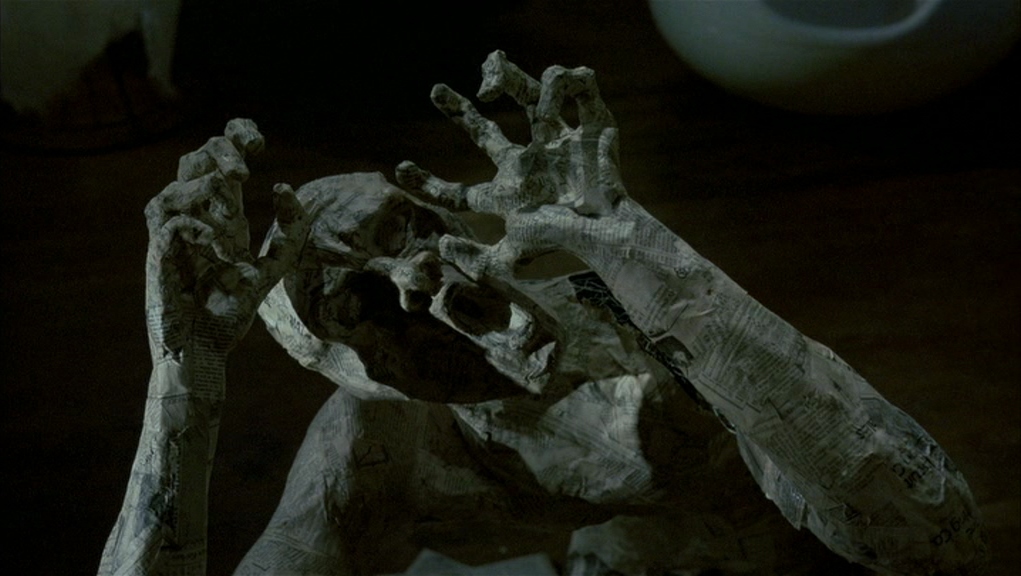
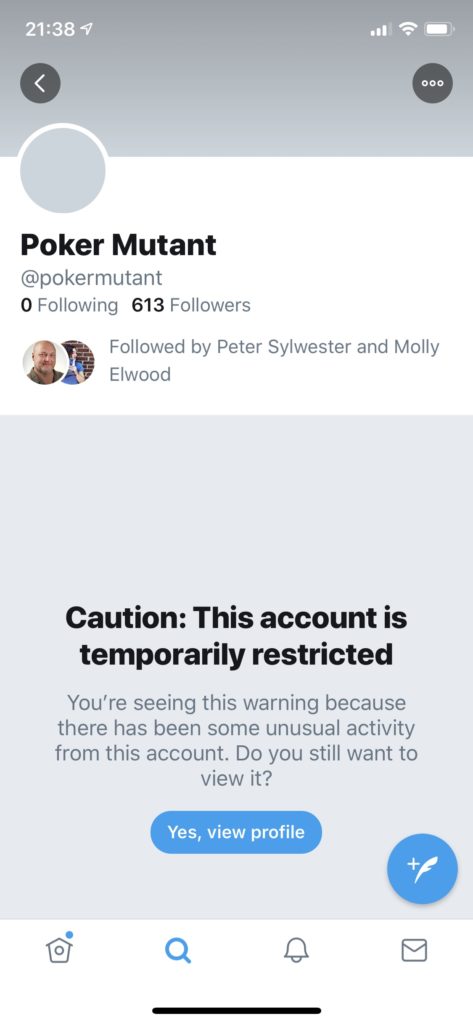 UPDATE: It took an entire weekend—the weekend where the Mike Postle/Stones Gambling Hall cheating scandal broke, nonetheless—but the account did come off restriction the morning of 30 September.
UPDATE: It took an entire weekend—the weekend where the Mike Postle/Stones Gambling Hall cheating scandal broke, nonetheless—but the account did come off restriction the morning of 30 September.